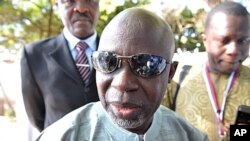Gambian opposition parties are boycotting Thursday's legislative elections after their request to postpone them was denied. As a result of the boycott, and what the opposition and observers call an unlevel playing field, the ruling party of President Yahya Jammeh is expected to retain total control of the government.
Polls opened in the tiny West African country, but voters have little choice but the ruling Alliance for Patriotic Re-orientation and Construction Party of President Jammeh. Ousainou Darboe of the United Democratic Party joined the boycott after the country's Independent Electoral Commission ignored the opposition's cries of foul.
"They are using government resources," said Darboe. "They operate from the offices of the regional governors and from the offices of the various local authorities to operate."
The opposition remains critical of the government's control over media and the military to tilt election results in its favor, as well as the alleged use of intimidation at the polls. Alex Vines of the Chatham House policy institute says the opposition's intentions are good, but their methods are flawed.
"I can understand the frustration of the opposition and why boycotting the elections would be attractive. Tactically, though, time and time again, this often results in further marginalization," said Vines.
He says that could prove more problematic under Jammeh, who has been in power since he seized control in a 1994 coup. The Gambia ranks 132 out of 167 in The Economist Intelligence Unit's most recent democracy index. Vines says that the elections, which have improved in transparency, are not the problem.
"The main issue, I think, is the wider context of what's happening in The Gambia and the difficulties of non-governmental organizations to operate and the limits on freedom of expression," said Vines.
The opposition has called for intervention from the Economic Community of West African States (ECOWAS), which agreed with the opposition's complaints, but did not send an observation mission. In contrast, ECOWAS lauded the fairness of the recent presidential election in Senegal, which it hopes will provide an example for its neighbors. The Gambia is completely surrounded by Senegal and has no closer neighbor.
News
Gambian Legislative Elections Take Place Amid Boycott, Suspicion
- By Nick Loomis




